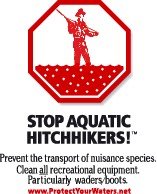NUTTY FOR NYMPHS
Get Out The Spring Nymph Box
fish 'em low and slow

-------

.. It's that time of year. Some streams are mud soup. Some streams have a bit of color. Some streams are high, cold, and clear. Some are even low, cold, and clear.

It's all good and it's all in flux.
.. Whatever the situation; now is the time for subsurface prospecting. The fish are getting energetic and are ravenous after the winter starvation.
.. There are midges on the surface. There are little mayflies and there are a few caddis, -
HOWEVER - the big action is below the surface.
.. The catching has been better than expected; probably due to the bit of warmth we've experienced lately.
.. You have to pick your poison for the situation - BUT it's nymphs for now. Streamers are for the masochistic head hunters, (like our neighbor Alvin.) They work, but it takes time, patience and skill beyond belief.
.. For a bit of insight into some techniques for the current conditions just blip on over to the
Fishing Blog at
Madison River Outfitters.
.. Everyone should have a SJ Worm. That's our tip of the hat. We got 'em, we use 'em, but they are really no better than the ones shown below.

.. The flies shown below are as close as we come to recommending flies for fishing. There are even flies for the surface, but the others are the choice right now.
.. We have used some of these fly patterns for 40 years or more - really - and they continue to work.
.. They do not satisfy the need for experimentation, nor do they tickle the fancy of feather merchants, nor are they the latest and greatest; they just suit us.
.. Other flies work fine, and other flies may even work better. One old local fly fisher was fond of asking and answering a question in the same breath:
"Why are there so many flies? - Because they all work!" We agree.
.. Spring fishing in and around Yellowstone National Park is weather and runoff dependent - no surprise there. The weather can be brutal well into June, and the runoff can keep you off of the water for days, (or weeks,) at a time.
-------
.. This year we're being teased with a bit of warmth early. We're not fooled. The last few days of sleet, snow, wind and rain, remind us that Spring is a capricious season.

.. The flies shown here are designed to work well in a variety of conditions and in that sense are "generalized flies." There are some that could be considered 'imitative,' however most will fall into the 'attractor' class - that's O.K. with us. Gott'a attract a fish to catch it.
--------------
THE FLIES
..
Montana Duster: We use piles of these all season long and start the Spring nymphing with it. This pattern, and the
original Feather Duster are staples in our Spring assortment. The yellow color is most popular. However, about this time each year the pink makes an appearance - probably taken for an egg - who knows? Sizes: 6 - 18.
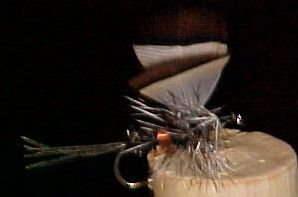
..
Yellowstone Coachman: The occasional day in early Spring that allows a good hatch is an unanticipated joy. The fish are seldom very selective, (well - sort'a,) and this fly works wonders. Sizes: 10 - 18.
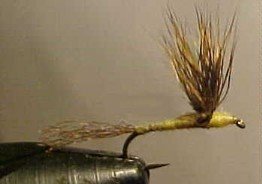
..
The Yellowstone Cinch: This is our other choice for early Spring dry fly days. It is a local adaptation that floats like a cork, and can be quickly tied at home or on the water. Size is the key to this and other early season flies in Yellowstone. Later the fish become much more selective. Sizes: 10 - 18.

..
Yellowstone Spruce Fly: This fly was developed by some neighbors that use a bubble on a spinning or casting rig for Fall fishing. It is an exceptional fly when cast with a fly rod in the spring. It's a bit gaudy for many of our purists, but with a nice slow presentation in the cold waters of the early Spring it looks like a big sack of groceries to hungry trout. Sizes: 4 - 12.
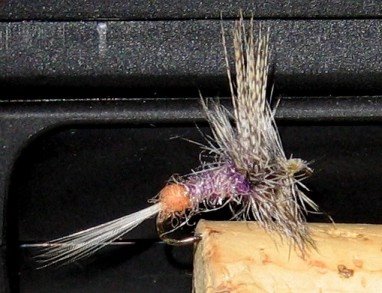
..
Yellowstone Morning Glory: This is an all season fly that we like to keep handy for fishing in the film, or slightly submerged in the Spring. It is a traditional 'early morning' fly for those that find the right foggy morning after the rare early Spring hatch. In the Summer it's a useful attractor. There are many flies similar to this local variant and most will do - we use this one. Sizes: 10 - 16.
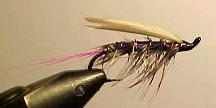
..
Yellowstone Winter Grub: This looks like nothing other than something to sample - or some such. We fish this all Winter and carry it into the Spring. It's a heavy fly, though it casts well, and is useful for 'dredging' those big fish that you know are there. It's apparently an old fly from the Salmon & Challis area in Idaho. We usually have this in a variety of sizes for the desperation moments. Sizes: 4 - 10.
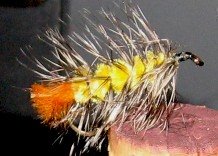
..
Woolly Worm: Spit the words out of your mouth if you must - it's a great Spring fly in Yellowstone Country. Sometimes we use small ones on the surface when the snow flies are out. Black or yellow seem to be the colors of choice, we've got more yellow ones. Sizes: 10 - 18.

..
Yellowstone Badger: This prickly little devil is one that serves a multitude of purposes. Float it, sink it, splash it, strip it, or just dap it - it is a winner. This fly is similar to the other nymphs that are popular around here - the Pheasant Tail, and the Hare's Ear. We use them all, but keep coming back to this one. Sizes: 12 - 18.
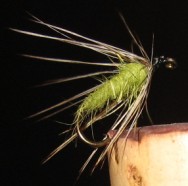
..
Stiff Hackle Nymph: This variant of the soft hackle variety is not a favorite among many folks in the fly fishing community. It does work well and it is used by some of our 'more mature' neighbors. We've used it since the 80's and found it to be a useful resource - but we tend to forget it too. This is an all season fly that we just put in the fly box because we have them. Sizes 12 -18.

..
Deer Hair Caddis: This little fly we borrowed from Jason Neuswanger over at
The Trout Nut. We fished it all last year along with the local versions and it was a standout performer. It's a dark fly that is consistent with some of our early Caddis hatches and we like it very much. Sizes: 10 - 18.
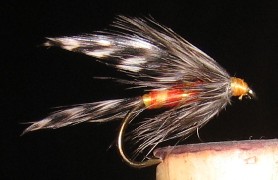
.. The
Quick -N-Easy is one of those flies that makes many a fly fisher cringe. It is gaudy, flashy, big, and effective. It is famous for its spectacular refusals, and that's it's purpose. Tie it on early and then fish the fly that the fish are taking. This will show you that there are really fish in the water, and it may even catch one or two. Sizes: 8 - 14.
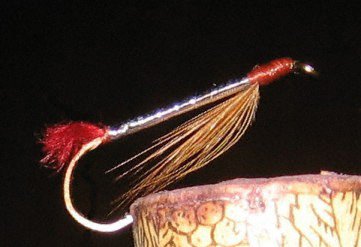
..
Hellifiknow: This pattern is reminiscent of the
Black Nose Dace and
Micky Finn patterns. It is useful when the water is murky and you need to get a bit of twinkle down deep. It's a Spring staple and often a 'what if ?' kind of fly for prospecting. Sizes 4 - 12.
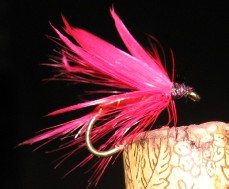
..
Scarlet Ibis: We've carried this fly since the early 60's. Back then they came on a card and you got four for a dollar. They were imported from Japan and attracted the novice and expert alike. A bit of color never hurts the old fly boxes. This traditional wet fly is one that we fish for fun. It may be taken for an egg, a flying saucer, a cowboy's bandanna, or "who knows what?" - but it takes a few fish every year. Sizes: 8 - 14.
---------------
.. Here's a note about the
Shop Vac. It's proven its worth in subsurface fishing over the last few seasons. Tied a bit larger than the traditional sizes it is a fine upper fly in a tandem rig and can be seen on a slow shallow swing.

.. We have an irrational fondness for the local
Feather Dusters, (Original, Montana, Egg,) yet we always have a few
Shop Vacs as well.
.. For year-round success this pattern ranks very high. Most people use the bead head variety. Contrarians that we are, we stick with the fluff sans bead.
.. The recipe lets you know why we're fond of these by the dozen.
Recipe.
Hook: size 12 - 18, Thread: black, Body: pheasant tail fiber, Rib: medium, (or fine,) copper wire, Wing: gold or white Zelon, (cul de canard works fine.)Instructions.
Move thread to the rear of the hook, attach pheasant tail fibers and the wire, return thread and fibers to head, counter wrap the wire rib to the eye, tie off, attach zelon, (or cul de canard,) on top of the hook shank, whip finish a large clunky head... These can be greased up real heavy and floated if you choose. The smaller sizes float very well.
-------
.. Well, it's a bit sunny and bright overcast in the forecast. Then some more winter. We're headed to a short section of a famous creek that is clear nearly year round. Hope the trusty steed breaks down in the right neighborhood.
-------
.
 .. The current pile of popcorn storms is raising havoc with the park roads. Some are open, some are closed, some are both open and closed.
.. The current pile of popcorn storms is raising havoc with the park roads. Some are open, some are closed, some are both open and closed.






















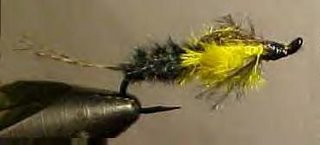
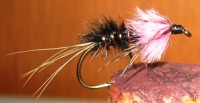





















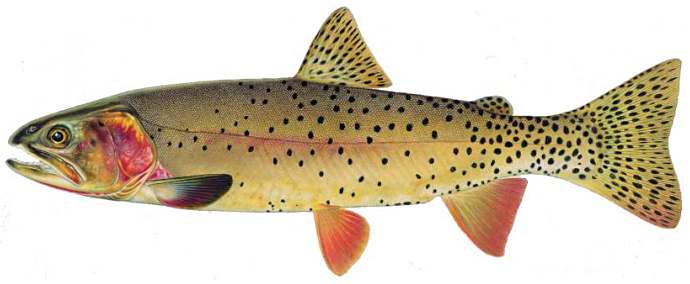

.jpg)
